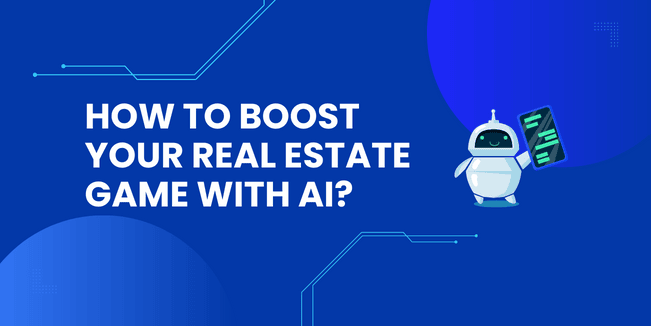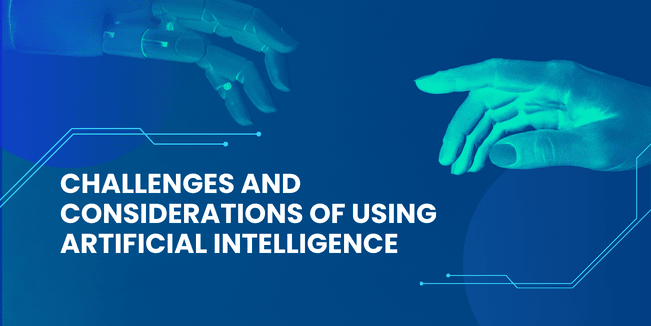ai
real estate app development
realestateapps
How to boost your real estate game with AI?

It’s simple, implement real estate chatbots
The rise of artificial intelligence (AI), a disruptive force that promises to transform the way we purchase, sell, and invest in real estate, is central to the technological revolution. With AI's incredible ability to process data, identify trends, and forecast outcomes, its incorporation into real estate operations opens up a world of possibilities for both industry experts and consumers. In the world of real estate, where it's all about smooth journey and quick help, AI chatbots are the ultimate game-changers. These smart chatbots are transforming how real estate businesses operate. They can beat human agents with speed and feasibility.
In this age of data-driven decision-making, the potential benefits of applying AI to real estate are both exciting and deep. AI-driven breakthroughs are altering how we approach real estate transactions, from predictive analytics that estimate property values to chatbots that offer tailored property recommendations. This blog will explore the dynamic area where technology and real estate markets collide, researching how AI may improve your real estate game. Join us on this trip as we unearth the tactics, applications, and insights that will enable you to successfully navigate the current real estate arena.
Understanding Artificial Intelligence in Real Estate
In the real estate industry, "artificial intelligence" (AI) refers to technology that is smarter than your typical calculator. Giving robots a brain allows them to assimilate data, learn from it, and make judgments that appear, well, human-like.
But here's the interesting part, AI is no longer a sci-fi fantasy. It has wiggled its way into the real estate industry, bringing with it a breath of fresh air. Consider AI to be a digital Sherlock Holmes, sifting through mountains of property data to discover trends, forecast future values, and assist us in making smarter decisions.
Navigating the Future of Real Estate with AI-Powered Insights
Artificial intelligence in real estate is similar to having a crystal ball that can see into the future property market. It's not magic; it's a combination of science and processing power. Consider AI-powered predictive analytics. These algorithms browse through market data, property characteristics, and historical trends. They can even predict what will be the future value of the property.
Assume you're looking for a cozy bungalow. AI goes above and beyond to consider indicators such as neighborhood growth, similar prior sales, and market swings. It's as if you had an army of number crunchers on your side, whispering, "Hey, this bungalow might be a goldmine in a few years."
So, whether you're looking for a potential investment or a first-time buy, AI has your back. It's not just about numbers and codes; it's about using data-driven insights to uncover real estate hidden gems.
AI chatbots - the disruption of real estate businesses
The impact of AI on the real estate industry goes well beyond novelty; it's a paradigm-shifter that's changing the entire experience. Let's explore the many ways artificial intelligence (AI) is flexing its digital muscles and changing the landscape of real estate transactions.
One of the most notable expressions of AI's effect is the use of chatbots in real estate, which is generating substantial disruption in the way the industry operates. With the ability to grasp and respond to human language, these virtual assistants are revolutionizing customer interactions and reshaping the customer journey.
How AI powered chatbot support real estate:
Getting virtual assistant anytime, anywhere
Artificial intelligence chatbots are like your real estate professionals working non stop. Whether it's midnight or the weekend, your customers will get instant answers. AI can make your real estate agencies 24/7 and will help nurture leads.
Chatbots are important because you won’t feel stupid asking important questions. Sometimes talking to someone can be a bit intimidating. Talking to a chatbot makes that a lot easier!
Petter Bae Brandtzaeg
FAQs made easy
Many real estate agents get frustrated with frequently asked questions. Chatbots are never tired of the same old queries and can support you potential clients. They can tell you all about detailed property information, prices, and legal issues without making you wait till office hours. You can simply create a real estate chatbot template and it will all be handled.
Schedule property viewings, seamless
Scheduling property viewing can be a real hustle. Constant back-and-forth to pick a time, indecisive site visitors and numerous messaging channels. But guess what? AI chatbots make it so easy. You can simply send a message and schedule meetings or decide on virtual tours. These automation tools will make both the prospective clients and the live agent happy.
Personal touch of AI
Finding your dream home with ease is one of the top tricks AI has up its sleeve. It's like having a compatible matchmaker in real estate. Your preferences, scrolling patterns, and history are all taken into account by AI, which then creates a list of property alternatives that will make your heart skip a beat.
Imagine this: You've had your eye on those trendy lofts, and suddenly, bang! AI swoops in and offers a variety of comparable homes that catch your interest. It acts as your own real estate genie, delivering you possibilities that are especially suitable for you.
Best real estate chatbots understand your wants better than you. They know your style, the location you desire, your budget, and what you're into. Thanks to artificial intelligence they will find the real estate of you dreams.
Smart spend
Real estate chatbots cost is not as expensive as you might think. IBM says that chatbots save up to 30% in total costs of business. You don’t need to hire extra support agents, you can simply implement real estate messenger bots or reach out to us for a tailored ai chatbot. It's like saving cash while keeping things cool.
Challenges and considerations of using artificial intelligence

Even if the rise of AI in the real estate sector promises a wide range of advantages, it's critical to navigate the potential difficulties and ethical dilemmas that come along with this technical advancement.
Biases in AI Algorithms
Just as people can have biases, so can AI algorithms, which frequently have unexpected results. Artificial intelligence (AI) has the potential to unintentionally support discriminatory behaviors in real estate recommendations and pricing if it is fed historical data that reflects cultural preconceptions. For instance, if historical patterns favored particular places due to cultural prejudices, AI might continue to place a focus there, escalating disparities already present. This problem underlines how important it is to build transparent, impartial, and fair algorithms and properly curate training data.
Human Oversight and Accountability
As AI systems get more intelligent, the temptation to hand everything over to them grows. Giving robots total control, however, carries some risk. To guarantee that AI-generated insights and decisions adhere to moral principles and make sense, human oversight is essential. Although AI is capable of processing enormous amounts of data, human judgment is essential in complex situations that call for empathy, nuanced knowledge, and a comprehensive viewpoint.
The bias dilemma
The possibility for reinforcing housing discrimination is a stark illustration of the difficulties AI faces in the real estate industry. Consider a machine-learning algorithm that unintentionally perpetuates biases against particular groups by recommending homes based on past data. The algorithm may exclude underrepresented communities if historical patterns point to a disproportionate focus on wealthy neighborhoods. This not only exacerbates inequality but also offers a disconcerting picture of how a sector of the economy unintentionally widens social divides.
The real estate sector must proceed cautiously in the face of these obstacles and make sure that AI is used morally and responsibly. We can fully utilize AI while avoiding the dangers that could impede development and increase current disparities by encouraging transparency, fair data, and human oversight.
From property predictions to virtual tours, the future starts here

As we conclude our investigation into the intersection of AI and real estate, it's time to collect the pearls of wisdom we've discovered along this informational trip. AI has proven to be a formidable ally in the changing world of real estate, from predicting property prices to improving customer experiences.
Let's go over the highlights. We've seen how AI-powered property searches provide personalized results based on your interests, making house hunting a snap. Price forecasts based on data-driven insights provide us with a view into the future of property values, assisting both buyers and sellers in making informed decisions. As AI takes us into potential houses from the comfort of our screens, virtual tours and visualization are no longer limited by distance. Not to mention the critical role AI plays in risk assessment and fraud detection, protecting investments in an uncertain landscape.
The potential for artificial intelligence to alter the real estate sector is limitless. This isn't about incorporating technology for the sake of integrating technology; it's about radically transforming how we navigate properties, investments, and transactions. The way we purchase and sell houses is changing, and AI is driving the drive. It's no longer just about location, location, location - it's about location, data, insights, and everything in between.
Are you ready to disrupt your real estate business with AI Chatbots?
So, here's the deal: artificial intelligence isn't just a buzzword; it's the future of real estate. It's about adopting the tools that can help you improve your game and get an advantage in an ever-changing market. Whether you're a first-time buyer, an investor, or a seasoned real estate agent, researching AI solutions that match your goals is critical to remaining competitive and current.
The adventure does not end here. As technology and artificial intelligence (AI) evolve, so does the real estate sector. So arm yourself with knowledge, curiosity, and an open mind. AI chatbots enable instant help, tackle boring FAQs, set up tours without a hustle and know your needs and wants. They're like the secret sauce that makes everything easy, smooth, and totally satisfying.
A study shows that 91% of customers believe that businesses should implement chatbots. So, if you're in the real estate market, why not try AI chatbots and take your customer interactions to a whole new level?
Don't be afraid of the digital transformation; embrace it and explore how AI can help you make better decisions, improve your strategy, and traverse the real estate landscape with greater confidence.
Experience mDevelopers' AI-Powered Savings and Improved Customer Service

And if you’re still not convinced how AI can save you money and improve customer experience, simply reach out to our agents at mDevelopers. We know how to deal with artificial intelligence development services in real estate.
Frequently asked questions

Both real estate experts and hobbyists have interesting questions about AI chatbots. The most frequently asked questions concerning AI chatbots in real estate are covered in this part, along with information on how they operate, their advantages, and how they might affect the future of the sector. This FAQ section seeks to give you thorough insights into the world of AI chatbots in real estate, whether you're a seasoned real estate agent, an inquisitive buyer, or anybody else intrigued by the marriage of AI and property.
How much does it cost to get a bot?
The cost of acquiring a chatbot for real estate can vary greatly depending on aspects such as complexity, functionality, customization, and the supplier you select. There are a few alternatives to consider:
DIY Platforms
Some platforms let you to create basic chatbots using pre-made templates at a reasonable cost. These might cost anything from nothing to roughly $50 per month.
Custom Development
If you need a more powerful and customized chatbot for your real estate business, hiring developers can range from a few thousand dollars to tens of thousands of dollars, depending on complexity. You can reach out to mDevelopers team for a custom pricing tiers.
Subscription Services
Many AI firms provide subscription-based services in which you pay a monthly charge based on the degree of service and features you require. Monthly fees might range from a few hundred dollars to over a thousand dollars.
Enterprise
Large-scale chatbots with extensive capabilities can cost considerably more, perhaps exceeding the six-figure mark.
How are chatbots used in real estate?
Chatbots are utilized in the real estate sector in a variety of ways to improve client interactions, accelerate procedures, and offer information. We've tackled most of the in the article, but here's a summary of the most common applications:
Property Inquiry and Information
Chatbots can provide information on properties such as pricing, characteristics, location, and availability.
Scheduling
Chatbots can help customers plan property showings or appointments with real estate agents based on their preferences and availability.
Virtual viewings
Chatbots can lead customers through virtual property tours, delivering a genuine experience without requiring a physical visit.
Lead Generation
Chatbots can interact with website visitors, collect their information, and classify them as possible leads for agents to follow up on.
Frequently Asked Questions
Chatbots can provide quick responses to frequently requested queries, reducing customer service response times.
Market Trends and Insights
Based on accessible data, chatbots can provide insights on market trends, property values, and investment opportunities.
Follow-up Automation
Chatbots can nurture leads by sending follow-up communications.
What is the dark side of chatbots?
While chatbots have numerous advantages, there are also possible downsides and ethical concerns:
The Loss of Personal Touch
Relying too much on chatbots might result in a loss of personal connection, which is critical in the real estate market where trust and rapport are important.
Biased Responses
If chatbots are not properly taught, they may produce biased or discriminating responses, reinforcing inequity and unjust behaviors.
Data Privacy
Chatbots collect and store user data, which poses privacy problems if it is not handled safely and openly.
Intent Misinterpretation
Chatbots may misinterpret user requests, resulting in erroneous or irrelevant responses and frustrating users.
Limited Understanding
Complex or complex enquiries may be a difficulty to chatbots, resulting in dissatisfaction for users looking for specific answers.
Technology Dependence
Relying only on chatbots may impede human-agent interactions and may reduce customer satisfaction.
Initial Setup and Maintenance
Developing and sustaining an ai chatbot demands resources, time, and continuing work, which may be too expensive for some firms.
The real estate sector has clearly benefited greatly from AI chatbots, but it's important to recognize that there may also be issues and restrictions to take into account. The "dark side" of chatbots comprises worries about data security, privacy, and the potential for misunderstandings. Strong security measures are required since these digital assistants deal with sensitive data and communicate with clients. They also need to be able to understand and react to complicated questions with accuracy.
To maintain trust and deliver excellent client experiences, it is essential to strike a balance between automation and human interaction. Addressing these issues will be crucial for maximizing the potential of AI chatbots as the real estate sector navigates this fascinating technological landscape.